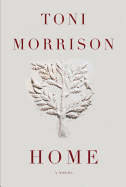
This masterfully written novella uses alternating points of view, swift characterization-by-action and metaphorical symmetry with a compression that is simultaneously a tour de force and a tantalization. The real-time action of Home--Frank Money's quest to overcome his post-Korean War trauma and confront the Georgia of his childhood in order to rescue his sister from mortal peril--is easily dramatized within the short form.
The novella opens with a near prose-poem set in italics in which Frank recounts a memory of protecting "Cee" (short for Ycidra) when they were kids in Lotus, Ga., a town he hoped never to see again after he enlisted. This first-person beginning sets up Home's ingenious voice relay. In the italicized chapters, the protagonist confides in the author and sometimes argues with her about how she presents his story. These chapters alternate with third-person chapters that dramatize Frank's quest from a storytelling perspective; Morrison also interjects three singular authorial chapters dedicated to the significant women in Frank's life. In the penultimate chapter, the novella's point-of-view elevates all the way to a resounding omniscience; it concludes with a poem written in Frank's "I" voice. Regardless of narrator, the vividness of the chapters and their concise accumulation of experiences give Home a broader scope than would seem possible in so few pages.
Morrison fans will find much to appreciate and learn from in Home, but may also yearn for the amplitude of her earlier novels. --Holloway McCandless, blogger at Litagogo: A Guide to Free Literary Podcasts

